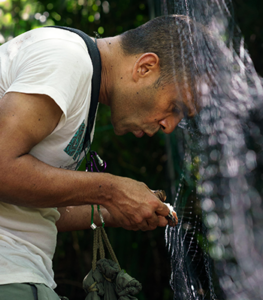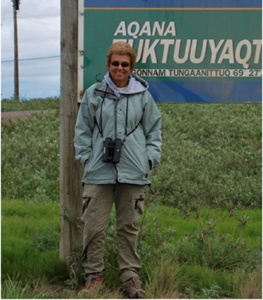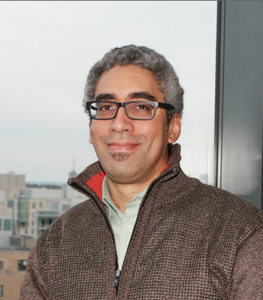As you know, the American Ornithological Society (AOS) is evaluating how to address harmful English bird names, and we are thrilled to announce that Carlos Daniel Cadena, Erica Nol, and Troy Peters have agreed to co-chair these efforts moving forward. With guidance and input from our Diversity and Inclusion Committee, the AOS selected leaders who are DEIJ-minded, constructive, collaborative, engaging, thoughtful, open-minded, big-picture oriented, and active listeners. Daniel, Erica, and Troy exemplify these traits and are eager to help our community determine how to change harmful and exclusionary English bird names in a thoughtful, proactive way.
Carlos Daniel Cadena

I am a Professor in the Departamento de Ciencias Biológicas and Dean of the School of Sciences at the Universidad de los Andes in Bogotá, Colombia. As a researcher, I am most interested in questions about biogeography and speciation, combining field, lab, museum, and computational work, and I have an increasing interest in outreach activities promoting the importance and value of birds, natural history collections, and science in general to society. I became a member of the American Ornithologists Union and the Cooper Ornithological Society as an undergraduate in the late 1990s. I have served as a Reviewing Editor for The Condor (now Ornithological Applications) and an Associate Editor for The Auk (now Ornithology), and I was a member of the South American Classification Committee of the AOS for more than a decade. I became an AOS Councilor in 2020 to help AOS continue its tradition of advancing the scientific study and conservation of birds, with a particular focus on expanding our scope and reach beyond North America and on strengthening our means to support students and early-career professionals. I am honored to serve as co-chair of the AOS ad hoc committee on English bird names, to which I bring my Latin American perspective and experience with systematic ornithology, while also accomplishing one of my main goals as an AOS Councilor, namely to help move us towards becoming a more inclusive and diverse group, with greater impacts on ornithological science, the conservation of birds, and society at large.
Erica Nol

I am a Professor of Biology at Trent University in Peterborough, Ontario. I have spent my career engaging with graduate students to conduct research on the ecology and conservation of birds. I have worked on birds in grassland, forest and, to the greatest extent, arctic environments. I have always had an intense interest in conservation and have used my position, as much as possible, to bridge the gap between academic research and policy. My job has also been enriched by interactions with a diverse mix of graduate students, who have taught me as much as they learn from me. In recent years, I have been actively assessing how I can more honestly address my own privilege and acknowledge how it manifests in my work, my home and community. I have worked to raise awareness of the surprising interaction between ornithology and social justice through talks to university classes and naturalist groups. Because of my strong interest in this issue and my desire to learn more, I agreed to serve as co-chair of the ad hoc committee on English bird names. I am humbled by what the other participants, with lived experience of hurt and hatred caused by myriad societal activities, will bring to this discussion.
Troy Peters

I am the Senior Engagement Manager for the National Audubon Society’s Great Lakes region. In that role, I work to activate the existing Audubon network by supporting the region’s 50-plus chapters, and to expand that network via programs that engage communities of color in conservation action and leadership. As part of the Audubon Great Lakes’ regional Leadership Team, I lead staff efforts to embed principles of equity, diversity, and inclusion into all of Audubon’s goals in the Great Lakes. This means pushing equity, diversity, and inclusion goals beyond outreach and education efforts to think about the ways to impact equity and inclusion through Audubon’s fundraising, advocacy, and conservation science work. This is my first opportunity to be involved directly with the American Ornithological Society. In working with Audubon chapter leaders and volunteers over the last six years, particularly on crowdsourced community science projects, I am excited by the possibility of growing opportunities for impactful connections between professional and amateur scientists. That excitement flows to my participation on the ad hoc committee on English bird names, where I am looking to learn about, and help develop, processes that make social justice perspectives a more organic part of scientific practice.
Stay tuned for more information on how these leaders will be moving our English bird names initiative forward!
I would be happy to see a move away from naming birds after people, objectionable or not, and toward names based on morphology, behavior, song, ecology, and/or geography. Today’s heroes are tomorrow’s embarrassing creeps.
I agree. Moving forward, let’s name birds for things other than people historically associated with them (history, apparently, has no relevance for today’s birders). But we’re NOT moving forward, we’re moving backward and trying to cancel historical figures who did things that some folks, in hindsight, regard as reprehensible. As for the idea promoted by many (but not by Hoffman) that we should change all person-related bird names to something more “appropriate”, such as the subjects listed in his post, let me suggest a possibly instructive exercise. How about suggesting new, more appropriate, English names for all the eponymously-named storm petrels worldwide. Most of them are named for their discoverer, or at least the person who demonstrated that they were species. For me, that is just as useful a piece of information as any of the other things suggested as sources for English names, especially in this group of ecologically, behaviorally, and morphologically similar birds that do not sing.
Specifically; Attwater Prairie Chicken should be Texas Coastal Prairie Grouse , which is accurate, non-disparaging and descriptive of its isolated and very limited range. This is the most endangered bird in North America. Most closely related to the extinct Heath Hen, it should also be a separate species , not a sub species of the Greater Prairie Chicken. Would appreciate an opportunity to discuss.